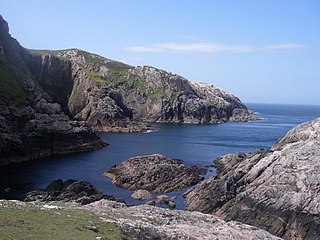Contents
| |||||
| Centuries: | |||||
|---|---|---|---|---|---|
| Decades: | |||||
| See also: | List of years in Scotland Timeline of Scottish history 1934 in: The UK • Wales • Elsewhere Scottish football: 1933–34 • 1934–35 | ||||
Events from the year 1934 in Scotland .
| |||||
| Centuries: | |||||
|---|---|---|---|---|---|
| Decades: | |||||
| See also: | List of years in Scotland Timeline of Scottish history 1934 in: The UK • Wales • Elsewhere Scottish football: 1933–34 • 1934–35 | ||||
Events from the year 1934 in Scotland .

Harris is the southern and more mountainous part of Lewis and Harris, the largest island in the Outer Hebrides, Scotland. Although not an island itself, Harris is often referred to in opposition to the Isle of Lewis as the Isle of Harris, which is the former postal county and the current post town for Royal Mail postcodes starting HS3 or HS5.

Scarp is an uninhabited island in the Outer Hebrides of Scotland, west of Hushinish on Harris. Once inhabited, the island was the scene of unsuccessful experiments with rocket mail, since commemorated in two films.

Stornoway is the main town, and by far the largest, of the Outer Hebrides, and the capital of Lewis and Harris in Scotland.
Alasdair Morrison is a Scottish Labour Party politician. He was the Member of the Scottish Parliament (MSP) for the Western Isles constituency from 1999 to 2007.

Clan MacDonell of Glengarry, also known as Clan Ranald of Knoydart & Glengarry is a Highland Scottish clan and is a branch of the larger Clan Donald. The clan takes its name from River Garry where the river Garry runs eastwards through Loch Garry to join the Great Glen about 16 miles (25 km) north of Fort William, Highland. The progenitor of the MacDonells of Glengarry is Reginald, 4th great-grandson of the warrior Somerled.
The Free Church of Scotland is a conservative evangelical Calvinist denomination in Scotland. It is the continuation of the original Free Church of Scotland that remained outside the union with the United Presbyterian Church of Scotland in 1900, and remains a distinct Presbyterian denomination in Scotland.

The Rocket Post is a 2004 British drama film directed by Stephen Whittaker and starring Ulrich Thomsen, Shauna Macdonald, Kevin McKidd and Patrick Malahide. It is set on a remote Scottish island during the late 1930s. The arrival of German rocket scientist Gerhard Zucker is not initially welcomed by the inhabitants of the island.

Lewis and Harris, or Lewis with Harris, is a Scottish island in the Outer Hebrides, around 24 miles (39 km) from the Scottish mainland.
Scottish Gaelic literature refers to literary works composed in the Scottish Gaelic language, which is, like Irish and Manx, a member of the Goidelic branch of Celtic languages. Gaelic literature was also composed in Gàidhealtachd communities throughout the global Scottish diaspora where the language has been and is still spoken.
Isabella Margaret MacAskill was a heritage activist and traditional Scottish Gaelic singer and teacher, often referred to as the "Gaelic diva".
Events from the year 1955 in Scotland.
Events from the year 1953 in Scotland.
Events from the year 1942 in Scotland.

Events from the year 1941 in Scotland.
Events from the year 1938 in Scotland.
Events from the year 1931 in Scotland.
Events from the year 1930 in Scotland.
Mary MacPherson (née MacDonald), known as Màiri Mhòr nan Òran or simply Màiri Mhòr, was a Scottish Gaelic poet from the Isle of Skye, whose contribution to Scottish Gaelic literature is focused heavily upon the Highland Clearances and the Crofters War; the Highland Land League's campaigns of rent strikes and other forms of direct action. Although she could read her own work when it was written down, she could not write it down herself. She retained her songs and poems in her memory and eventually dictated them to others, who wrote them down for publication. She often referred to herself as Màiri Nighean Iain Bhàin, the name by which she would have been known in the Skye of her childhood.
William Ross was a Scottish writer of Romantic poetry in Scottish Gaelic from the Isle of Skye and a Church of Scotland parish schoolmaster, who is often referred to as, "The Bard of Gairloch." Although Ross, similarly to Alasdair Mac Mhaighstir Alasdair, has been referred to as, "the Robbie Burns of the Highlands", he also bears close parallels to his near contemporary John Keats. Similarly to Keats, more than two hundred years after dying of tuberculosis while still in his twenties, Ross remains a highly important and admired figure in Scottish Gaelic literature and is considered one of the greatest poets and writers in the history of the language.

Elections toComhairle nan Eilean Siar took place on 5 May 2022 on the same day as the 31 other Scottish local government elections. As with other Scottish council elections, it was held using the single transferable vote (STV) system – a form of proportional representation – in which multiple candidates are elected in each ward, and voters rank candidates in order of preference.
{{cite web}}: CS1 maint: unfit URL (link)